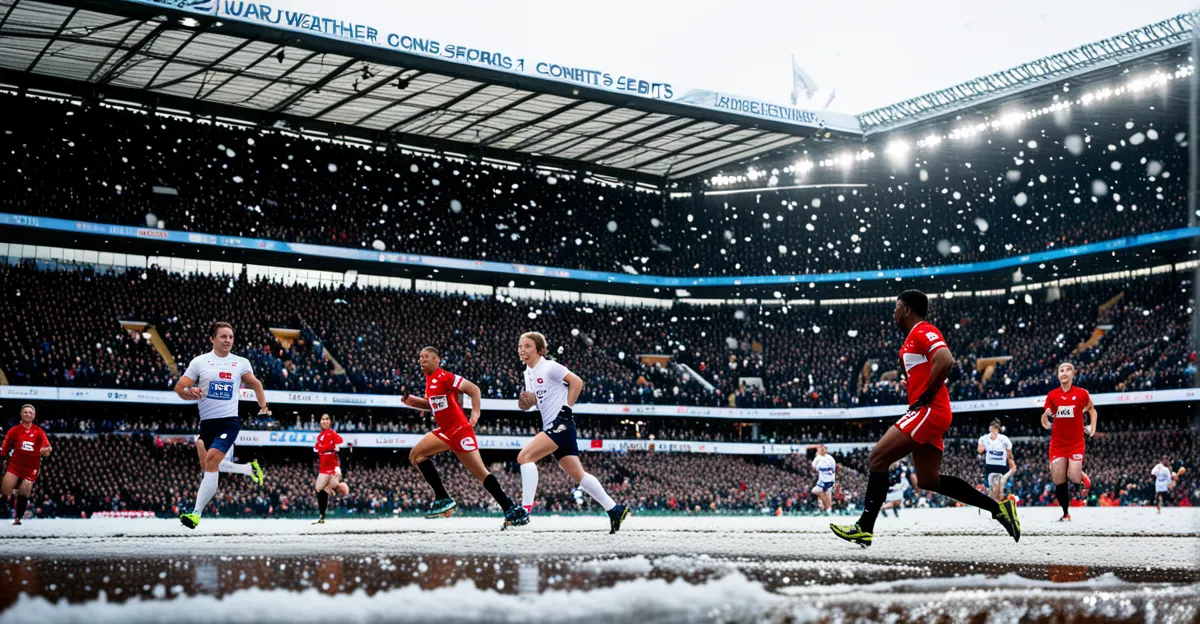Recent Weather Disruptions Affecting UK Sports Events
Recent weather events have significantly impacted UK sports, causing numerous cancellations and postponements across various disciplines. The combination of heavy rains, storms, and unseasonably cold spells has disrupted schedules, leading to logistical challenges for organisers and disappointment for fans.
Football, the UK’s most popular sport, frequently faces disruptions due to waterlogged pitches or frozen grounds. Matches have been delayed or moved to alternative venues when weather conditions made play unsafe. Similarly, cricket, heavily dependent on fine weather, has seen several fixtures abandoned due to rain, affecting tournament outcomes. Horse racing, known for its outdoor settings, often cancels or postpones events to protect horse safety and prevent injuries caused by slippery tracks.
Also to see : What strategies are used to enhance fan experience in UK sports?
One prominent example includes the postponement of matches in the Football League during periods of heavy snow and rain earlier this year, which led to fixture congestion later in the season. Similarly, key cricket matches in county championships were halted due to persistent rain, impacting players’ performance and fan attendance. These weather disruptions underline the vulnerability of UK sports events to adverse conditions and the ongoing need for adaptive measures.
Analysis of Weather Impacts on Various UK Sports
Different UK sports face unique challenges due to weather conditions, especially those played outdoors. Football, often played on natural grass pitches, suffers from waterlogging during heavy rain, which leads to unsafe playing surfaces and match postponements. In contrast, cricket is particularly sensitive to rain interruptions as the game requires dry outfields and specific pitch conditions to allow fair play, causing match abandonments or delays. Rugby, another outdoor sport, encounters similar issues with muddy grounds affecting player safety and game flow.
Topic to read : What role does technology play in enhancing UK sports experiences?
Athletics events, depending heavily on weather, can be disrupted by storms or cold spells, which impair both athlete performance and spectator comfort. By contrast, indoor sports experience fewer weather-related disruptions but can still be affected indirectly, for example, via transport delays during severe weather.
Examining recent cases, football matches in lower leagues were frequently suspended due to frozen turf or flooding, complicating fixture schedules and increasing the risk of congestion. Cricket county games recorded multiple washouts with implications for championship standings. These examples highlight how sport-specific weather impacts vary by the nature and requirements of each sport, creating distinct operational challenges.
Outdoor sports are inherently more vulnerable to weather unpredictability than indoor disciplines, emphasizing the necessity for tailored approaches in managing disruptions within each sporting context. Understanding these nuances is crucial for organisers aiming to minimise the effects of adverse weather conditions on UK sports.
Official Responses, Expert Insights, and Mitigation Strategies
Understanding the weather mitigation sports UK requires examining how officials and experts address disruptions caused by adverse conditions. Governing bodies have adopted several proactive measures to reduce cancellations and ensure the safety of participants and fans. For example, installing advanced drainage systems on football pitches minimizes waterlogging, allowing matches to proceed despite heavy rain. Similarly, the use of pitch covers in cricket protects the playing surface from rain, helping to preserve match integrity and limit abandoned games.
Experts, including meteorologists and seasoned athletes, emphasize the importance of early weather warnings, enabling organisers to adjust schedules or prepare venues accordingly. An official from a major football league noted, “Accurate forecasts combined with improved infrastructure mean fewer last-minute cancellations, benefiting all stakeholders.” These insights reveal a trend towards greater reliance on technology and data to anticipate and manage weather impacts effectively.
Long-term strategies focus on adapting UK sports to evolving weather patterns. This includes exploring the feasibility of more all-weather synthetic pitches in football and considering venue designs that offer better protection from elements. Collaborations between meteorologists, sports scientists, and event planners aim to develop comprehensive protocols that can be swiftly implemented during sudden weather changes.
Overall, the combination of expert commentary, officials’ initiatives, and innovative mitigation strategies signals a concerted effort within UK sports communities to contend with increasing weather challenges. This resilient approach helps maintain competition integrity, enhances safety, and improves the experience for fans despite recent weather events causing interruptions.











